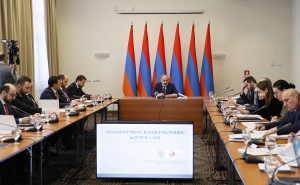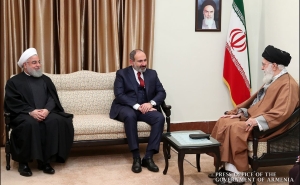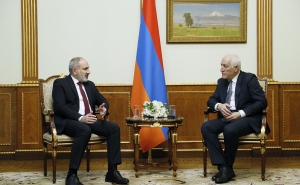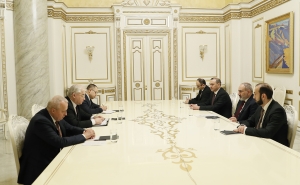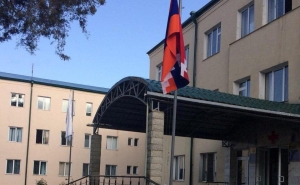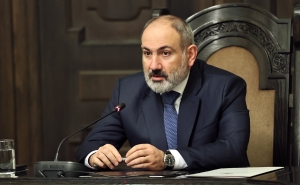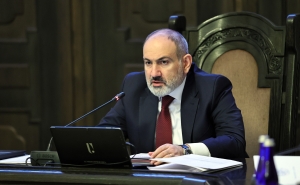 Pashinyan-Aliyev Meeting: Results and Talks Development Prospects
Pashinyan-Aliyev Meeting: Results and Talks Development Prospects
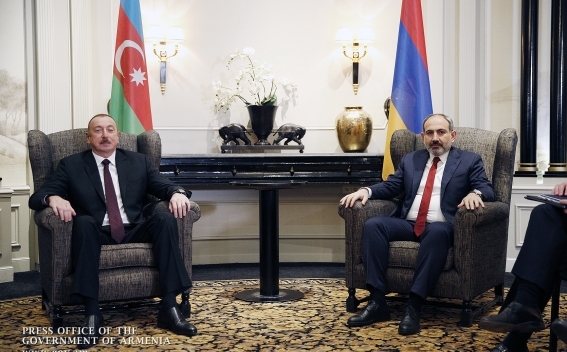
Positive assessment, lack of tangible results, can be a brief description of March 29 Vienna meeting between Nikol Pashinyan and Ilham Aliyev.
In a meeting with the Armenian community Pashinyan assessed the meeting positively meanwhile stressing that no breakthrough was recorded in the talks. “A process kicked off, that enables us to speak about our agenda, issues and pictures in mind,” Pashinyan noted.
Aliyev, in his turn assessed the meetings positively. “The meeting is important in terms of starting talks over content,” Aliyev said to TASS.
Aliyev, in his speech, reiterated that the change format will not change. To be noted that RA prime minister Pashinyan restated previously the bare necessity of fully engaging Karabakh in the talks process. On the eve of the meeting he had stated of including the issue on the agenda. The OSCE MG co-chairs’ statement on March 9, as well not mentioning Artsakh engagement in the current statement show that the Armenian authorities have not succeeded at least in this stage. Moreover Armenia’s claim on urgently engaging Artsakh in this stage is not perceptible for the mediators and the international community. The mediators have constantly stated that Artsakh will be engaged in the talks following coordination of principles, during the talks on Peace Agreement. So the Armenian sides have a lot accomplish to achieve their objective of getting their point of engaging Artsakh, across. And the thesis of legitimacy sounds not to be enough for that. Vague is another question: on behalf of who does Armenia’s prime minister negotiate?
The next question the Armenian authorities raised prior to the meeting, that was to be on the agenda of the meeting with Aliyev, was the necessity of settlement principles and clarification of elements. Given the joint statement of foreign ministers of Armenia and Azerbaijan and the mediators on March 29 meeting, the issue was on the agenda with “the leaders exchanging opinions on regulation process and content related issues.” However, Ilham Aliyev’s statement following the meeting that Azerbaijan’s priority is the so-called “de-occupation of Azerbaijani territories,” gives an impression that clarifications did not yield results. If the clarification is over and this is the result, then it raises concerns, and if clarifications are not over, then there should have been agreements not to make comments till the end of the process.
Meanwhile the necessity of providing constructive environment in the talks process for further tangible steps, is stressed. So the process of getting to know each other’s positions and clarifying approaches can’t last and clear cut steps will be needed. However in this stage and environment their nature will be hard to figure out.
Another noteworthy issue is confidence building measures. The joint statement reads that the two leaders reaffirmed the need for ceasefire reinforcement and direct communication improvement mechanisms referring to Dushanbe arrangements. No reference to Vienne, Sankt-Petersburg, Geneva arrangements reached and not completed following the April war. Azerbaijan was consistently attempting to avoid them with those arrangements implying an internationally controlled and transparent mechanism, which would allow to record ceasefire violations and fix the culprit. Official Baku rushed to take advantage of Dushanbe arrangements – oral and through bilateral format without international community engagement, to get rid of the previous ones. At a point attention shift from them led to overlooking those arrangements and the question remains: can they be brought back to the table or can it be considered that Azerbaijan succeeded in this issue.
Another thing is if Pashinyan, during his press conference recently did not rule out the possibility of prisoner exchange, in the first place given the necessity of returning Karen Ghazaryan, after the meeting he stated that if exchange is not possible then at least their family members should be given a chance to visit their captivated relatives. So exchange scenario in this stage seems not probable. Instead the statement stresses the necessity of “humanitarian measures.”
To sum up, the talks and constructive dialogues are necessary in the light of peacekeeping in the region. However talks can’t stay at the level of notifications and clarifications. Content related and clear cut steps will gradually become pressing. At this stage, the Armenian sides will need flexibility, cautiousness and calculated policy to push the interests of Armenia and Artsakh. Important will be to use perceptible and acceptable arguments first and foremost to the mediators and the international community, which will provide their support and reinforce our positions.
Other materials on this subject
- Russian forces have clearly failed in their duties: senators press Biden Administration to break Azerbaijan’s blockade The United States cannot stand aside while the Aliyev regime callously threatens the lives of Nagorno-Karabakh’s citizens, and must hold Azerbaijan to account for blocking a civilian population’s access...
- US calls for the full restoration of free movement through the Lachin Corridor "We remain concerned about impeded access to the Lachin Corridor and the humanitarian implications of this situation. This sets back the peace process and undermines international confidence. We call for...
- Azerbaijani forces violate the ceasefire in Artsakh The ceasefire violation was reported to the command of the Russian peacekeeping troops.
- Azerbaijani units violate ceasefire in several directions, Artsakh’s Defense Ministry says The Armenian side has no losses. The incidents of ceasefire violations were reported to the command of the Russian peacekeeping troops.
- Russian Diplomat Reassures Armenians Over Corridor In Karabakh "The parties are in direct contact, and I assure you that the peacekeepers will not move a single centimeter until there is a new corridor," Seleznyov said.
-
 17:08
17:08The regular session of the Anti-corruption Policy Council takes place in Jermuk
-
 15:05
15:05The Prime Minister sends congratulatory messages to the supreme leader of Iran and the President of Iran
-
 11:11
11:11Armenia sends earthquake aid to Turkey
-
 10:43
10:43Commemoration of the Pontiff St. Sahak Partev
-
 09:16
09:16Some roads are closed and difficult to pass in Armenia
-
 19:55
19:55Phone conversation of the Foreign Minister of Armenia with the U.S. Assistant Secretary of State for European and Eurasian Affairs
-
 18:30
18:30Prime Minister Pashinyan and President Khachaturyan meet
-
 18:20
18:20Ararat Mirzoyan with Co-Chairman of the OSCE Minsk Group of France Brice Roquefeuil
-
 17:01
17:01Humans could land on Mars within 10 years, Musk predicts
-
 16:45
16:45France, US urge 'immediate' end to Nagorno Karabakh blockade
-
 16:01
16:01Blockaded Nagorno Karabakh launches fundraiser to support quake-hit Syria
-
 15:59
15:59Earthquake death toll in Turkey rises to 18,342
-
 15:43
15:43Ararat Mirzoyan Held a Telephone Conversation with Sergey Lavrov
-
 15:06
15:06French president rules out fighter jet supplies to Ukraine in near future
-
 14:47
14:475 Day Weather Forecast in Armenia
-
 14:44
14:44President Vahagn Khachaturyan wrote a note in the book of condolences opened in the Embassy of Syria in Armenia
-
 14:20
14:20Azerbaijan’s provocations impede establishment of peace and stability – Armenian FM tells Russian Co-Chair of OSCE MG
-
 12:57
12:57France representation to OSCE: Paris calls on Azerbaijan to restore freedom of movement through Lachin corridor
-
 11:40
11:40Command of Kosovo forces highly appreciated preparation of Armenian peacekeepers
-
 10:16
10:16The United States withdrew from sanctions against Syria for six months the provision of assistance after the earthquake
day
week
month
Humidity: %
Wind: km/h


